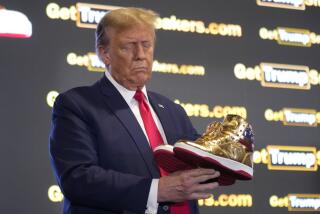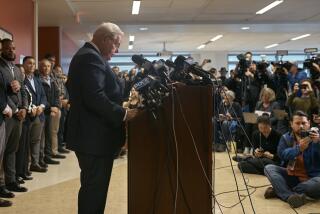COLUMN LEFT / ALEXANDER COCKBURN : More Shoes Are Dropping on Clinton : This time, scandal may overturn the bandwagon.
- Share via
Bill Clinton now moves east to the big industrial states with the plea that the race is all but wrapped up, and that Democrats should unify behind him and commence the long march toward victory over George Bush.
There are compelling reasons to ignore this invitation. First, there is still an able contender in the race, Jerry Brown, who has shown he can ignite ample constituencies. Brown has important things to say and can boast two terms running California, one of the largest economies in the world. He does not carry the personal baggage that has already nearly sunk the Clinton campaign.
Leave aside, for a moment, the personal scandals. Over the last month, Clinton had the chance to slip free of their shadow long enough to put forth his program and his vision. His inadequacies at once became obvious. He has passion only when denying that he’s an adulterer.
There is little in his long record as governor of Arkansas to lure the voter. On big issues--the environment, labor rights--he sold out. On most others he has hopped from one side of the fence to the other. Faced now with the challenge of how to handle a $6-trillion national economy in the midst of structural change, Clinton comes up with footnotes: an apprenticeship training program here, an accelerated highway bill there. Search his campaign literature for anything on worsening income distribution, the aerospace industry decline, the banking crisis, the consequences of speculative investment, high long-term interest rates, debt burden, declining productivity, the environmental crisis, and the candidate is tongue-tied.
Meanwhile, Republicans are licking their lips at the prospect of facing Clinton in November. Expect no mercy toward the draft dodger and alleged womanizer, whose successful efforts to get Gennifer Flowers a state job are a matter of record.
Clinton’s financial ties are similarly fragrant. The man who is campaigning across the country as the candidate of the common man and who calls for “fundamental change” has been monetarily fueled by a man linked to one of the biggest banking scandals in the nation’s history. Arkansas financier and political king-maker Jackson Stephens, with his son Warren, has helped raise more than $100,000 for Clinton. More important, Stephens’ Worthen National Bank extended Clinton a $2 million line of credit in January, when the campaign was reeling under the allegations of adultery.
It was Jackson Stephens who brokered the arrival of the Bank of Credit and Commerce International (BCCI)--the bank later identified as an institution of preference for global criminals and drug peddlers--into this country in 1977. He steered the bank’s founder, Hassan Abedi, toward Jimmy Carter’s budget director, Bert Lance, whose bank an Abedi front man took over. Stephens then helped clear the ground, according to SEC documents, for Abedi’s secret takeover of First American Bankshares. In the wake of BCCI’s downfall, these institutions are gravely weakened; other U.S. banks secretly taken over by BCCI--including CenTrust, the biggest S&L; in Florida, and Independence Bank of Encino--have collapsed, leaving taxpayers holding the bag.
Just as the BCCI trail heads back toward Arkansas and a prime cash register for the Clinton campaign, so too does a long-running and potentially explosive scandal within the state invite damaging investigation of the governor’s role.
As numerous stories in the Arkansas press have disclosed, the town of Mena in western Arkansas, and its airport, have long been cited as a regional center for international drug smuggling stemming from the arms trade with Nicaragua’s Contras. In 1990 Winston Bryant, now state attorney general, made the subject a campaign issue, denouncing the do-nothing stance of state officials. As recently as last October, Rep. Bill Alexander rustled up $25,000 in federal money to force the state into action.
But over the last four years, as state officials urged him to add gubernatorial clout and funding to the investigations, Clinton has done nothing. Last week, national reporters began to zero in on Clinton’s role, asking why he did nothing, in the face of press reports about Mena, and what were his ties (or those of his security entourage) to people linked to these $100-million-a-week drug operations.
Who wants a candidate destined to spend the next seven months explaining his past away? This is the candidate of pragmatism?
Clinton’s best hope is to label himself the irresistible bandwagon. But he still faces Brown, a resourceful and imaginative campaigner with a genuine vision. Clinton also faces the one enemy that will never quit the field, his own past. No one who wants to see Bush seriously challenged in November should regard the race for the Democratic nomination as over.
More to Read
Get the L.A. Times Politics newsletter
Deeply reported insights into legislation, politics and policy from Sacramento, Washington and beyond. In your inbox twice per week.
You may occasionally receive promotional content from the Los Angeles Times.










